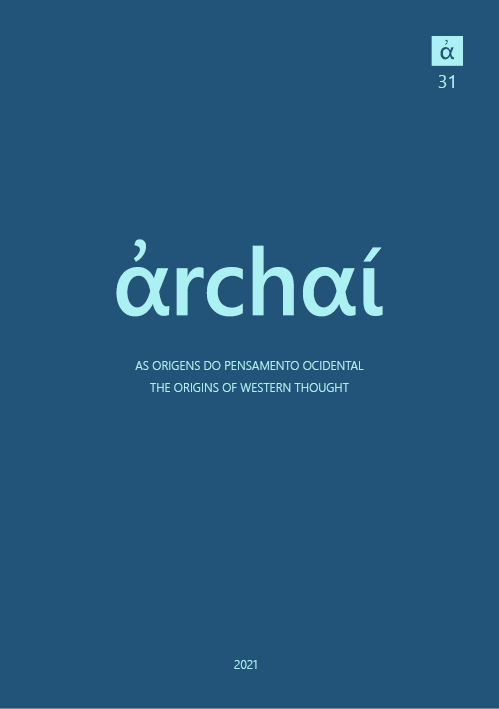Socrates and his livelihood
DOI:
https://doi.org/10.14195/1984-249X_31_05Keywords:
Self-sufficiency, work, exchange, Plato, XenophonAbstract
Known for his poverty, what does Socrates live on? A careful study of the sources reveals that he could satisfy his needs in three different ways: by begging, by the generosity of his friends and by the gifts promised by powerful men. However, regarding these means, the sources are ambivalent: some indicate that Socrates used them, but others that he firmly rejected them in order to preserve his independence.
Downloads
References
AZOULAY, V. (2004). Xénophon et les grâces du pouvoir. De la charis au charisme. Paris, Presses Universitaires de la Sorbonne.
BOURRIOT,F. (1995). Kalos Kagathos–Kalokagathia. D’un terme de propagande de sophistes à une notion sociale et philosophique. Etude d’histoire athénienne. Vol. 1. Hildesheim, G. Olms Verlag.
CHAPUIS, M.(2020). Le va-nu-pieds. In: HELMER, É. (dir.). Mendiants et mendicité en Grèce ancienne. Paris, Classiques Garnier.p. 53-70.
CHOUINARD, I.(2020). Le sage peut-il mendier?In: HELMER, É. (dir.). Mendiants et mendicité en Grèce ancienne. Paris, Classiques Garnier.p. 189-208.
DANZIG,G. (2010). Apologizing for Socrates.Lanham, Lexington Books.
DORION, L.-A. (2013). L’Autre Socrate. Études sur les écrits socratiques de Xénophon. Paris, Les Belles Lettres.
DORION, L.-A. (2018). Fundamental parallels between Socrates’ and Ischomachus’ positions in the Oeconomicus. In STAVRU, A.; MOORE, C. (eds.). Socrates and the Socratic dialogue. Leiden, Brill.p. 521-543.
DORION, L.-A. (2020). De quoi vit Socrate? Le refus de la mendicité et la tentation des cadeaux. In: HELMER, É. (dir.). Mendiants et mendicité en Grèce ancienne. Paris, Classiques Garnier.p. 163-188.DOVER,K. J. (1968). Aristophanes. Clouds(edited with introductionand commentary). Oxford, Clarendon Press.GIGON, O.(1953). Kommentar zum ersten Buch von XenophonsMemorabilien. Bâle, Reinhardt.HELMER, É. (2020). L’autarcie à l’épreuve de la mendicité cynique. In: HELMER, É. (dir.). Mendiants et mendicité en Grèce ancienne. Paris, Classiques Garnier.p. 209-234.
Traducciones
AGUILAR,R. M. (1996). Plutarco. Obras morales y de costumbres (introducción, traducción y notas). Vol. 8. Madrid, Gredos.
BIEDA,E. (2014). Platón. Apología de Sócratesy Critón(introducción, traducción y notas). Buenos Aires, Winograd.
DIVENOSA, M. y MÁRSICO,C. (2005).Platón. República(introducción, traducción y notas). Buenos Aires, Losada.
GARCÍA GUAL, C. (2007). Diógenes Laercio. Vidas y opiniones de los filósofos ilustres (traducción, introducción y notas). Madrid, Alianza.
MEDINA GONZÁLEZ, A. (2005). Cicerón. Disputaciones tusculanas(introducción, traducción y notas). Madrid, Gredos.
RODRÍGUEZ, I. y SANDIER, P. (1916). Quintiliano.Instituciones oratorias(introducción y traducción). Madrid, Perlado Páez.
VEGAS SANSALVADOR, Ana (1987). Jenofonte. Ciropedia(introducción, traducción y notas). Madrid, Gredos.
ZARAGOZA, J. (1993). Jenofonte. Recuerdos de Sócrates, Económico, Banquetey Apología de Sócrates(introducciones, traducciones y notas). Madrid, Gredos
Downloads
Published
How to Cite
Issue
Section
License
Copyright (c) 2021 Louis-André Dorion

This work is licensed under a Creative Commons Attribution 4.0 International License.
Given the public access policy of the journal, the use of the published texts is free, with the obligation of recognizing the original authorship and the first publication in this journal. The authors of the published contributions are entirely and exclusively responsible for their contents.
1. The authors authorize the publication of the article in this journal.
2. The authors guarantee that the contribution is original, and take full responsibility for its content in case of impugnation by third parties.
3. The authors guarantee that the contribution is not under evaluation in another journal.
4. The authors keep the copyright and convey to the journal the right of first publication, the work being licensed under a Creative Commons Attribution License-BY.
5. The authors are allowed and stimulated to publicize and distribute their work on-line after the publication in the journal.
6. The authors of the approved works authorize the journal to distribute their content, after publication, for reproduction in content indexes, virtual libraries and similars.
7. The editors reserve the right to make adjustments to the text and to adequate the article to the editorial rules of the journal.



